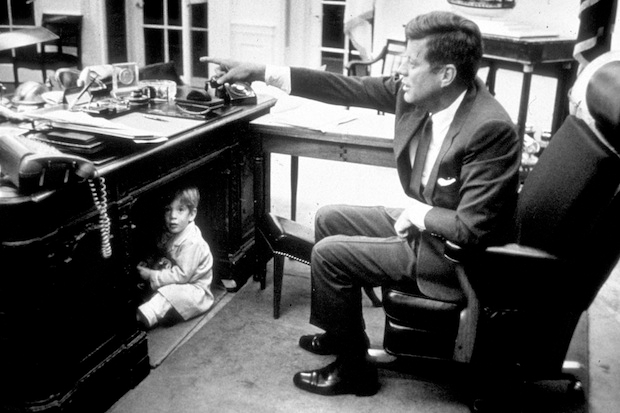A surfeit of anniversaries this week reminded us that on the day of President Kennedy’s assassination, C.S. Lewis (born 1898) and Aldous Huxley (born 1894) also died. Three such different figures are hard to imagine — Kennedy, the wily politician, Lewis, the tortured academic, Huxley the cool intellectual. Lewis is the one whose image and personality don’t fit; a man who appears cast from a different age from Kennedy and also from Huxley, who you can well imagine wielding an iPod and Twitter account. Yet it’s the pipe-smoking, tweed-suited Lewis who has been given the celebrity treatment this week, while the coolly cynical Huxley has been silenced, with not a feature or reading to be heard.
Lewis, of course, was connected with Tolkien and still scores highly because of the current fad for fantasy worlds and mock-epic battles between good and evil. Book of the Week, though, did not give us, as you might have expected, something from Narnia but rather Lewis’s spoof conversations between Lucifer and one of his minions — The Screwtape Letters. Screwtape, aka the Devil, is trying to teach Wormwood, his inept nephew, the arts of tempting. The tone, the subject, the style take us straight back to the 1940s and 1950s when words like ‘milksop’, ‘liturgy’ and ‘flippancy’ were in common use, Christian worship on Sunday was commonplace, and real temptation in the form of Walnut Whips and Jimmy Choos had not yet arrived.
It’s an old-fashioned read, rather dated and stylised. But, given voice by Simon Russell Beale, Screwtape becomes insidiously normal, seducing us with his honeyed insights before turning on the spite when we least expect it. Before long, I found myself squirming with discomfort as Screwtape mercilessly details his techniques for bringing us down, based on his incisive knowledge of, and contempt for, human frailty. Beale is devilish, adapting and changing his voice like a chameleon as he wheedles his way into our confidence. The music, too, at beginning and end, is perfect for the piece, setting a disquieting mood both lively and restless, full of tunes yet somehow tuneless.
Air Force One (Saturday, Radio 4) was an unusual take on the Kennedy anniversary, a drama by Christopher Lee that focused on what happened immediately after the shots were fired at the presidential cavalcade. Beautifully produced by the vintage (not old, just well matured) team of Martin Jarvis and Rosalind Ayres, with an American cast (so no offputting problems with accents), this play drew us in to the questions and doubts that took seed immediately. Jackie Kennedy wonders why no one followed up on the rumours that someone in Dallas wanted the president shot. She is puzzled that the secret serviceman closest to the president was replaced at the last minute. Did Lyndon B. Johnson want JFK dead so that he could take over? Why was LBJ so insistent that Air Force One should not leave for Washington until he had been sworn in?
It’s such a familiar story yet here it was given real tension and pace by the slickness of the dialogue and the interplay between the characters. We could hear their fear, not knowing how or why the president had been killed (were there more out there waiting to get them?), and also Jackie’s bemusement as she finds herself being forcefully persuaded to stand alongside Johnson and Lady Bird as he was sworn in on Air Force One (the only place in Dallas reckoned to be safe). That weird photo of her standing erect alongside the new president and his wife while still dressed in her blood-spattered pink suit begins to make sense — ‘We need to keep Mrs Kennedy on the reservation,’ drawls LBJ.
Curlew River, also on 4 (Tuesday), was broadcast as part of that other anniversary of the week, the centenary of the birth of Benjamin Britten, with most of the celebrations taking place this weekend on Radio 3. In this smooth-crafted feature, the tenor Ian Bostridge took us through rehearsals for a new production of the ‘church parable’. First performed in 1964, Curlew River tells of a mother who has lost her child through abduction and is driven mad with grief, inspired by a story from the Noh tradition that Britten had seen while on tour in Japan. Not a bundle of fun, then, and the blend of medieval plainchant, eastern gamelan and English Church music does not at first sound promising.
But Bostridge and his supporting experts were so passionate about Britten’s achievement in taking his love of English landscape and infusing it with strains from abroad, and their voices were so cleverly woven together, that after just half an hour I really wanted to hear the whole piece. It’s so complicated and difficult to perform that in order to put it down on paper Britten, who was always very precise, invented a new musical symbol to use alongside crotchets, quavers and semi-breves. The curlew, a kind of squashed ‘m’, indicates that all the performers should wait here until everyone else catches up before carrying on. It’s the kind of small but telling detail that resonates.






Comments